From an old testament-like plague of locusts to a state-threatened WhatsApp ban, Egypt has witnessed its share of bizarre non-political events this past year.
Ahram Online takes a look back at the highlights of these odd economy-related happenings of 2013:
1- The plague of locusts
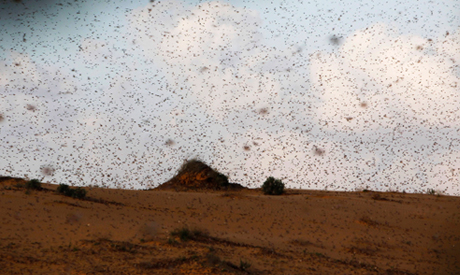
File Photo: locust attack (Photo: Reuters)
Swarms of red locusts descended on Egypt in February, traveling from Upper Egypt and the Red Sea Coast to surprise Cairo's inhabitants.
Their passage lasted two months, threatening the country's agricultural produce at a critical time for its economy, when Egypt's budget deficit had reached LE160 billion and foreign reserves had fallen to less than half of their pre-revolution levels (some $36 billion).
A ton of locusts can eat the same amount of food in a single day as about 2,500 people, according to the international Food and Agriculture Organization (FAO).
Infestations of red locusts have struck Egypt six times in the past six decades. In 2004, the Land Centre for Human Rights, a local NGO devoted to agriculture issues, reported that the locusts that year had damaged 38 percent of Egypt's crops.
2- Suez Canal vs. giant Maersk ship
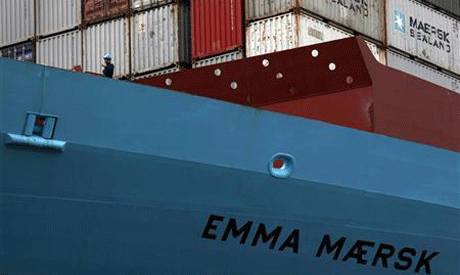
(Photo: Reuters)
Emma Maersk, one of the world's largest container ships, was on the brink of drowning in February due to mechanical problems at the northern entrance of Egypt's vital artificial waterway.
Suez Canal tugboats successfully dragged the 397-meter long vessel towards the Mediterranean, to prevent the ship from blocking the waterway should it sink.
3- Egypt's first smart tablet (Was it real or a prank?)
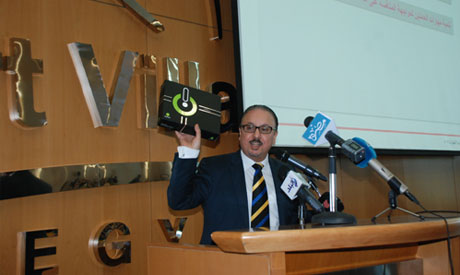
Yasser ElKady the CEO of Egypt's ITIDA unveils the new Egyptian tablet (Photo: ITIDA)
Amidst great fanfare, Egypt unveiled its first "entirely" locally-produced smart tablet, under the trademark 'Inar,' in April.
The minister of telecommunications and information technology Atef Helmy said that the first 10,000 smart units would be produced before the end of the year.
But in September, an anonymous senior government official told state-owned Al-Ahram Arabic news website that "Inar" was merely assembled in Egypt, and that in fact all of its hardware parts were Chinese.
The hype surrounding the tablet, the official said, had been an attempt by the then-in-power Muslim Brotherhood government to exaggerate its achievements.
4- The dry hotel along the Red Sea
In April, Egypt's Red Sea tourism-friendly city Hurghada witnessed the opening of a no-alcohol resort – designated by state media as the first of its kind in the Red Sea– which allocated an entire floor to women only.
The opening ceremony included lining up alcohol bottles on a bar and breaking them, spilling the alcohol, to announce the beginning of a new Islamic approach to tourism under the administration of Islamist president Mohamed Morsi.
In the same month, the government announced that no licenses to sell alcohol would be issued for new residential suburbs on the outskirts of Cairo and Alexandria, citing residents’ safety concerns.
5- The man-ban in Egypt's women’s spas
In a move to salvage Egypt’s tourism sector from a sexual harassment epidemic, tourism minister Hisham Zaazou ordered establishments nationwide in May to block men from working in women’s spas.
The tourism ministry said it had recorded 150 cases of sexual harassment of tourists over the past two years. There have also been three recorded rapes in the Red Sea resort of Sharm El-Sheikh.
6- A ship in Egypt's Blue Hole and Canyon
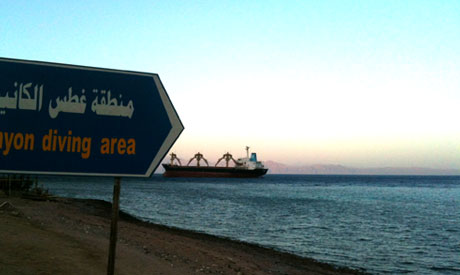
The foreign ship docks in the Egypt's diving zone Canyon (Photo: courtesy from REPS)
In May, coral reefs were devastated in the world-renowned diving spots in Egypt's Red Sea, the Blue Hole and Canyon after a foreign ship, dubbed the 'Sea Lord,' swerved from its course, lowering its anchor into the reef bed.
"How is it possible that this ship was able to approach the Egyptian coast without any attempt by the military to verify the captain's intentions or the ship's situation?" said an anonymous member of the NGO Rescue and Environmental Protection Society (REPS).
7- The pending ban on WhatsApp and Viber
In June, former Head of the National Telecommunications Regulatory Authority (NTRA) Amr Badawy told Ahram Online that a committee had been formed to review the status of popular smartphone applications WhatsApp and Viber, which allow users to make free calls and send free messages internationally, to decide whether to ban them, or restrict them somehow.
Badawy cited both security and financial concerns as being behind the initiative.
"These applications allow subscribers to make free calls, messages and share files while their sources remain unknown. Pre-paid subscriptions will face losses," he explained.
Badawy did not address that applications require Internet access, which is not free in Egypt.
8- Tourist city Luxor gets tourist-slaying governor

Screenshot showing new Luxor governor Adel El-Khayat being sworn in
In mid-June Islamist President Mohamed Morsi startled local and international tourism officials by appointing Adel El-Khayat, a founding member of Egypt's militant Al-Gamaa Al-Islamiya group, as the new governor for Egypt’s famous tourist destination, the Upper Egypt province of Luxor.
Al-Gamaa Al-Islamiya, of which the 52-year-old El-Khayat was a leading member, was responsible for the infamous 1997 Luxor attack in which at least 58 foreign tourists and four Egyptians were killed.
El-Khayat resigned a week after his appointment, following a media uproar and tourism minister Hisham Zaazou threatening to quit in protest.
9- The boat that caught fire…for a week

Maersk Kampala Container ship (Photo: Maritime Connector Website)
In September, a fire aboard Maersek Kampala ship, south of the Suez Canal was finally extinguished after ravaging on-board cargo for more than a week.
Three barges and seven tugboats belonging to Egypt's Gulf of Suez and Red Sea naval base participated in the fire-fighting effort. No injuries have been reported.
Maersek explained that weather conditions had prevented fire-fighting tugboats from getting close enough to the ship to put out the blaze.
10- The return of the green crab to Egypt
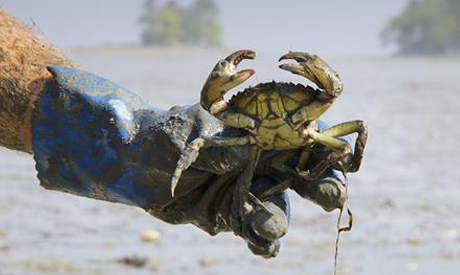
Green crab (Photo: Reuters)
In December, Egyptian lakes on the Mediterranean Edko, Manzala and Borolous witnessed the re-emergence of invasive green crabs for the first time in fifty years, prompting concern from local fishermen.
The green crab, which originated in Europe and Northern Africa and is dubbed the cockroach of the sea, is considered one of the 100 worst invasive species and has been blamed for ruining several soft shell clam fisheries around the world.
Short link: